Dubai, UAE, 3 April 2022: Global officials commended the first ever Middle East and North Africa Climate Week (MENA Climate Week) organized from 28 to 31 March 2022 in Atlantis The Palm, Dubai. The event achieved remarkable success and gained widespread praise from prominent institutions and figures concerned with climate action around the world.
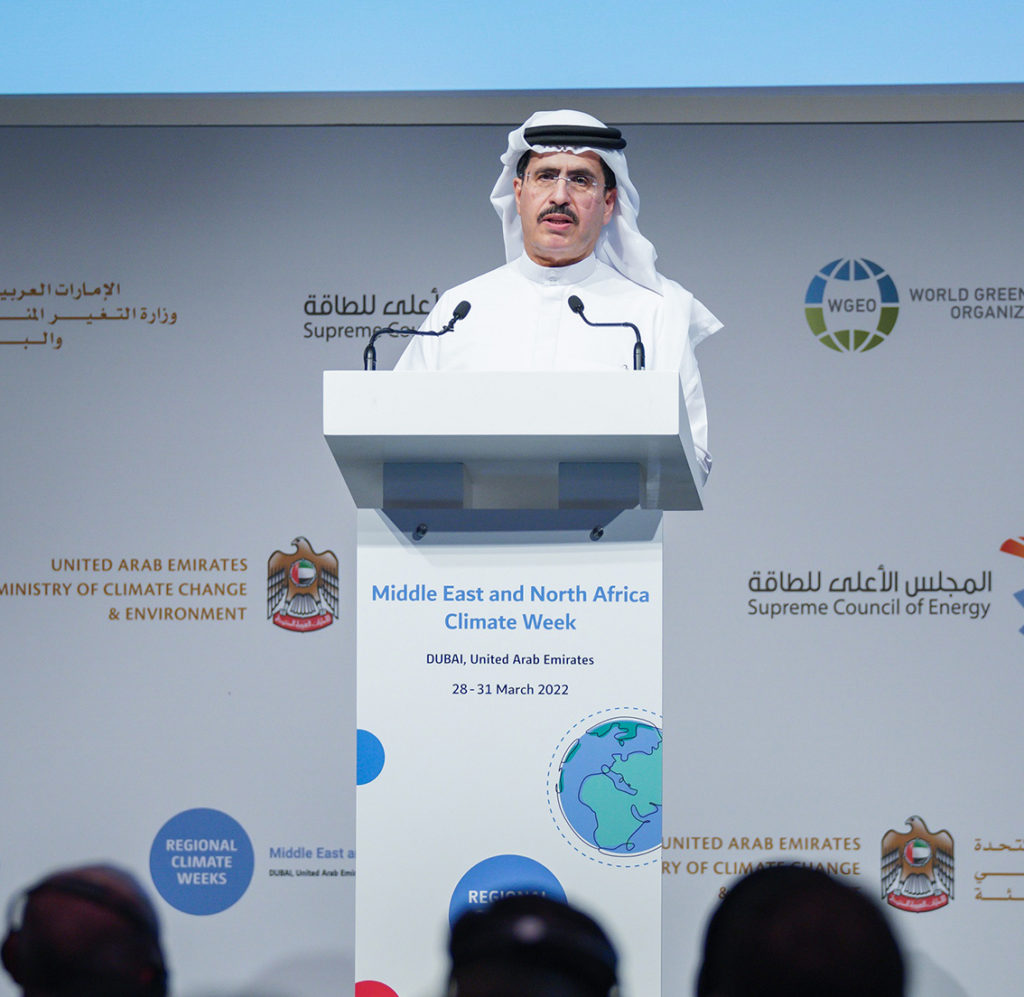
The event was hosted by the UAE Government, represented by the Ministry of Climate Change and Environment (MOCCAE), the World Green Economy Organization (WGEO), and Dubai Electricity and Water Authority (DEWA), in collaboration with the United Nations Framework Convention on Climate Change (UNFCCC), the United Nations Development Programme (UNDP), the United Nations Environment Programme (UNEP), and the World Bank Group. It was supported by regional partners, including the International Renewable Energy Agency (IRENA), the League of Arab States Secretariat, the United Nations Economic and Social Commission for West Asia (ESCWA), and the Islamic Development Bank (IsDB).
Covid-19 and the Climate
Although COVID-19 continues to be a threat for humanity today, but climate change remains the largest threat facing humanity this century. Day after day, we realise the dangers of climate change, which requires us to mobilise capacities and concerted efforts to confront this dilemma that affects all parts of the world. The MENA Climate Week served as an ideal forum for exploring these areas and facilitating solutions and discussions to collectively address these challenges for a safer future for humanity.
Joining Hands for Growth
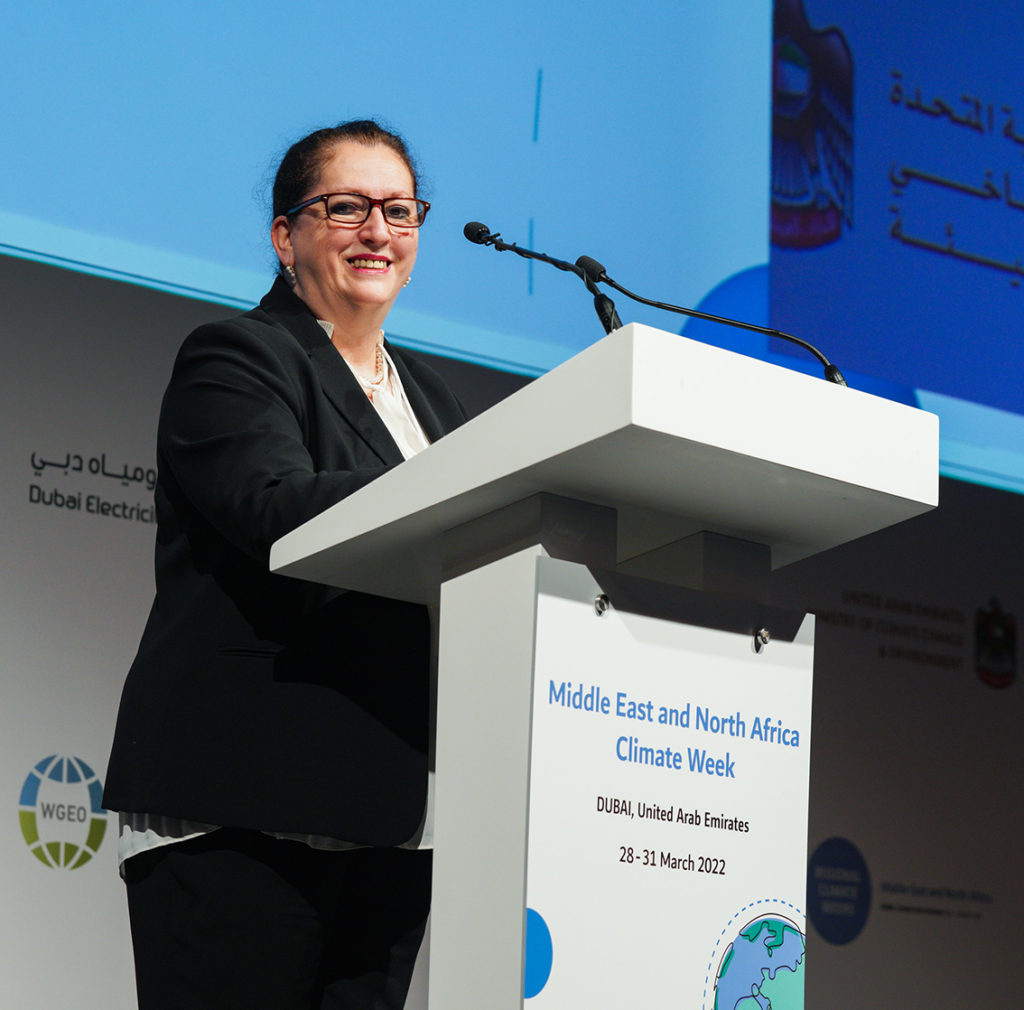
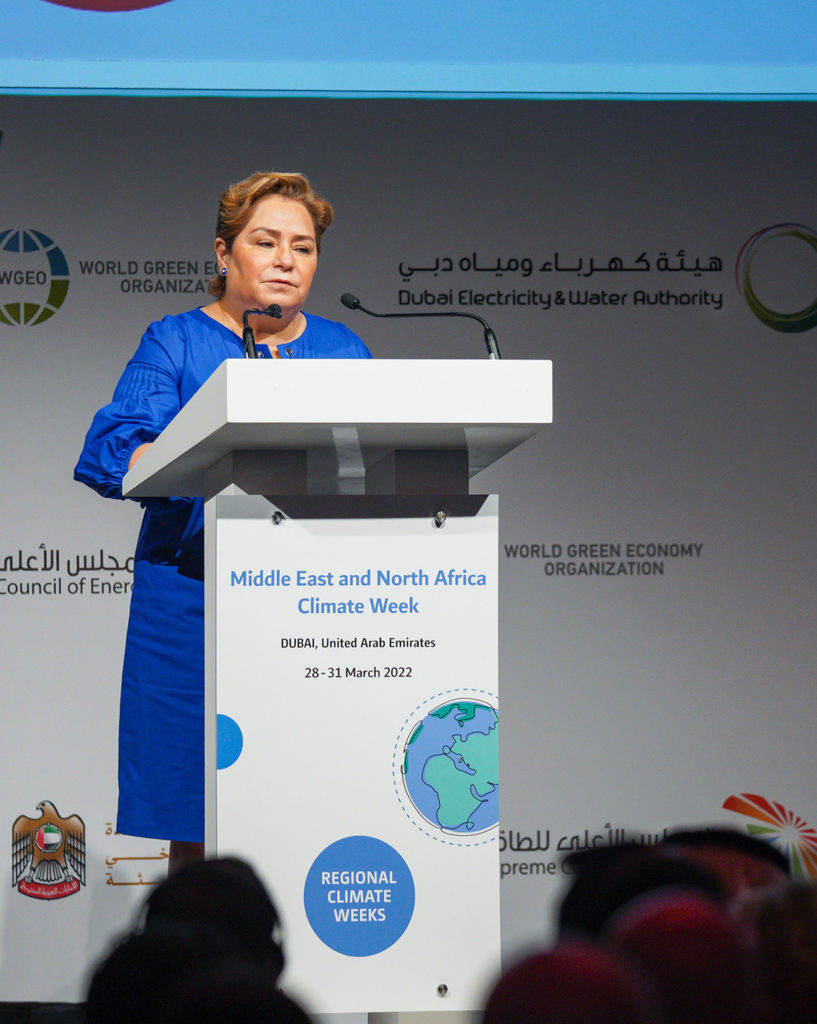
HE Saeed Mohammed Al Tayer, Chairman of the World Green Economy Organization and Managing Director and CEO of Dubai Electricity and Water Authority (DEWA), said, “Covid-19 is, without a doubt, the most immediate threat humanity faces today. Climate change, on the other hand, continues to be the century’s most pressing issue. Although the two issues are distinct, the principle of collaborating to address common global threats is the same. It is imperative that we join hands to embark on a new path to pursue green development by speeding up the change in growth model and strengthening a low carbon economy through innovation. The current period is fraught with both challenges and opportunities. On one hand, the pandemic has impacted global development and exacerbated obstacles to the United Nations’ 2030 Agenda for Sustainable Development, while on the other hand, it has served as a catalyst for policy shifts in many countries toward a green economy. However, there is still a need for a holistic approach to transitioning to an inclusive and green economy, tailored to each country’s unique circumstances. Forums like the MENA Climate Week encourage collaboration with a collective objective of addressing the climate emergency.”
UAE’s Proactive Role
H.E. Patricia Espinosa, Executive Secretary of the UN Framework Convention on Climate Change (UNFCCC), said, “The UAE’s proactive role in combating climate change is laudable, with the country pointing out how it was leading the way when it came to finding climate solutions and tackling climate change. The country’s aspirational net-zero emission ambitions, as well as the world’s largest solar energy fields, serve as a model for the rest of the world. The Climate Week provides an open opportunity in the transition to net-zero emissions and protects communities and economies against the worst impacts of climate change, bringing together stakeholders to discuss regional solutions and strengthening the global response to climate change. The event certainly reiterates the importance of dialogues and forums such as regional climate weeks, which bring together experts, dignitaries, and government officials to promote sustainable recovery and achieve the objectives of the Paris Agreement.”
Renewables for a more sustainable quality of life
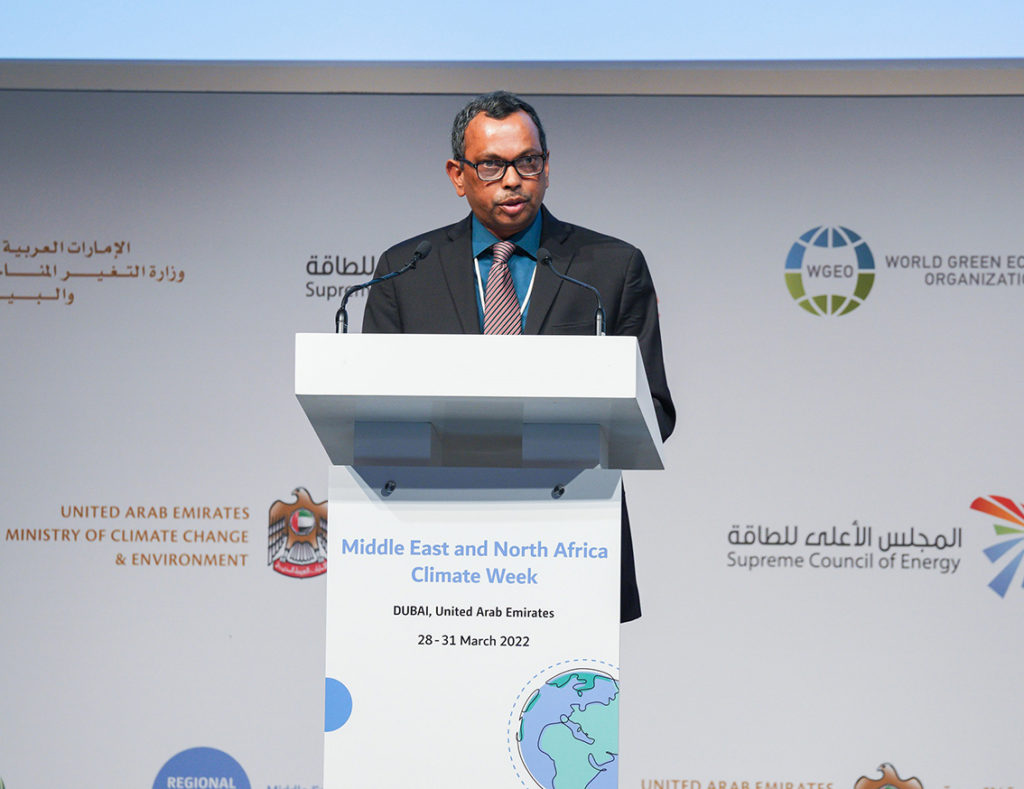
HE Dr. Nawal Al-Hosany, UAE’s Permanent Representative, IRENA, said, “Transitioning to renewable energy is vital for climate mitigation and meeting the Paris Agreement’s goals. Energy demands will rise in tandem with predicted global population increase, and we cannot afford to risk the planet’s health as we raise future generations. Renewable energy has become the most important source of new power in the recent decade. When energy consumption reduces substantially, as it did during the pandemic, renewable solutions were able to meet the demand of entire nations at a far lower and more efficient rate than traditional energies. However, renewables must grow faster to ensure a more sustainable and reliant world. Renewables do present an unlimited source of power. By transitioning to renewable energy, we would also be ensuring a more sustainable quality of life for societies such as improved air quality.”
Unique Opportunity
Achim Steiner, Administrator of the United Nations Development Programme, said, “The MENA Climate Week presents a unique opportunity for countries and particularly the African countries to both gain and shed light on their climate change initiatives and political actions. Furthermore, the world is working towards COP27 in Egypt, driving forward the growing green recovery through the sharing of best practices on climate action in key areas such as climate finance, climate-smart agriculture, low-carbon mobility, as well as innovative climate adaptation solutions.”
Seize Transformative Climate Action Opportunities
Inger Andersen, Executive Director of the United Nations Environment Programme, said, “The Glasgow Climate Pact kept the Paris 1.5 °C target alive, but only just. It is critically important to seize this opportunity to contribute to the pressing global climate action that is sorely needed. The Middle East and North Africa Regional Climate Week provides a critical chance to seize transformative climate action opportunities in the area and expedite the transition away from fossil fuels, ensuring a just and sustainable energy transition for all.
The MENA Region Has Evolved Swiftly in Energy Transitions
Ms. Khalida Bouzar, UNDP Assistant Administrator and Director of the Regional Bureau for Arab States, said, “Renewable energy has a key role to play in the region’s sustainable energy transition, which must be considered within a broader framework of socio-economic development of the region. Given its great resource potential, notably in solar energy, the MENA region has evolved swiftly in energy transitions. The Arab world has enormous potential to grow in the renewable energy sector, which accounts for only 7 per cent of total energy in the region. The need for quick actions and collaborations to explore strategies and adapt to climate change impacts, through local knowledge, as well as corresponding technical and financial support, is critical.”
Roadmap to the Upcoming COPs
Dr. Venkata Putti, Program Manager, Climate Change Group, The World Bank, said “The MENA Climate Week serves as a roadmap to the upcoming COPs which will be hosted in the region, following a series of net-zero commitments made by the Gulf countries in Glasgow last year. It will prove to be an essential platform for discussion and collective action on the region’s sustainable solutions and low-carbon pathways, while the World Bank looks forward to leading the consultations on national actions and economy-wide approaches to deliver sustainable and green recovery in the short run and decarbonization in the long run.”
Addressing major climate change issues
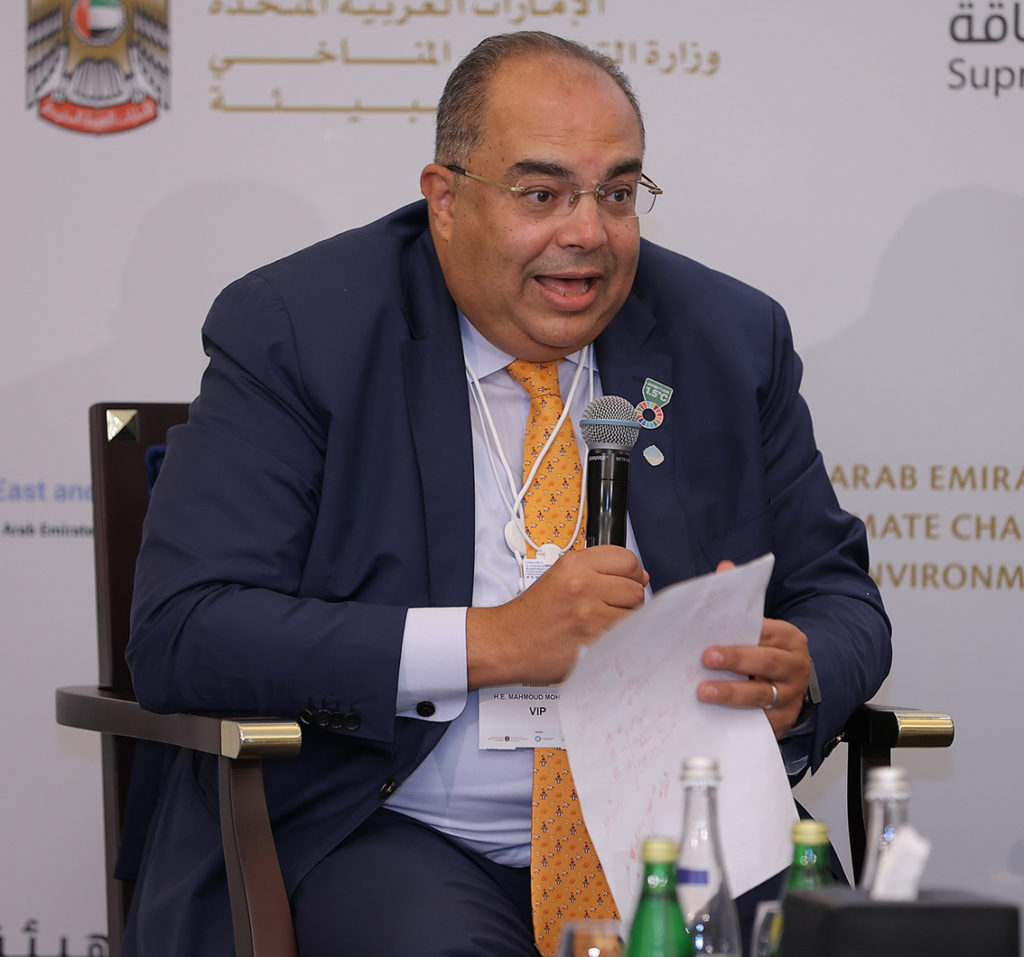
Dr. Mahmoud Moheildin, COP27 Champion and UN Special Envoy on Financing the 2030 Agenda said, “The MENA Climate Week has brought together a diverse group of governments, investment firms, universities, and others, aligning with our vision to achieve Sustainable Development Goals (SDGs). The event serves as an ideal platform to highlight and address major climate change issues. The upcoming COP27 will be held in Egypt in November, following other summits that agreed to uphold the provisions of the Paris Agreement (COP21). Despite the current state of international uncertainty and confusion, the next summit is expected to implement these provisions effectively. We strongly believe it’s time for countries to fulfil the promises and pledges they made in accordance with the scientific report of the Mutual Government Committee, particularly in light of the Paris Agreement’s goals for limiting carbon emissions. The world calls for more investments to limit these emissions and efforts must be made in this regard, as the repercussions of drought, floods, hurricanes, and wildfires are becoming more tangible.”
Key Recommendations of MENA Climate Week
- Reaffirm our continued commitment to the 2030 Agenda for Sustainable Development, especially SDG13 to address climate change.
- Call on all stakeholders to continue providing a constant, multi-sectorial and multi-layered assistance towards achieving our carbon neutral targets, which can contribute to the creation of sustainable economies, increased employment, social security and prosperity.
- Invite development partners and the private sector to continue contributing significantly to the sectoral transformations mainly in the energy, urban infrastructure and transport sectors with the view to approach these transformations as opportunities for sustainable and inclusive economic development.
- Commit to keep the issue of gender equality and the full participation of the youth central to the development and delivery of activities, including in policy development to combat climate change.
- While recognizing the urgent need of climate finance being made available for mitigation but also for adaptation purpose, there is urgency for national governments to establish policies and regulatory frameworks to de-risk private sector investments, to mobilize finances and to guide investors
- Recommend the international community that when setting the new collective quantified goal on climate finance, important consideration should be given to the quantity of climate finance in a manner that addresses the needs and priorities of developing countries, but also to the quality of finance to ensure climate finance is accessible.
- Encourage national governments and development partners to align their interventions, combine their efforts and initiatives and ensure a whole-of-society inclusive approach with meaningful multi-stakeholder engagement for climate action, including civil society, the private sector and academia.
- Recommend that the planning and development of long-term low emission development strategies which currently largely involves the Ministries of Environment and/or Climate Change is extended Ministries of Economy, Finance, Energy and others to truly unlock the potential of this process and consider the establishment of macro- economic roadmaps of just transition and accompanying policy options, involving all relevant Ministries and breaking down silos.
- Recommend that proper consideration is given to just transition and long-term planning as it goes beyond more than simply energy transition. It is a holistic approach to the transition of societies and economies and must be approached as such, by considering and implementing planning through a cross-sectoral, economy-wide approach, with mutli-stakeholder engagement.
- Encourage the incoming Presidency of COP27 and the Government of the United Arab Emirates as future host of COP 28 to take note of the outcomes of the MENA Climate Week which will be presented to them in the coming weeks with the request to consider them and to advance negotiations in particular in the areas of adaptation, mitigation and climate finance.
- Encourage the incoming and future Presidencies of COPs to shift the focus of the negotiations to making implementation of the Paris Agreement, ensuring it becomes a cornerstone of future mandates and decisions.








